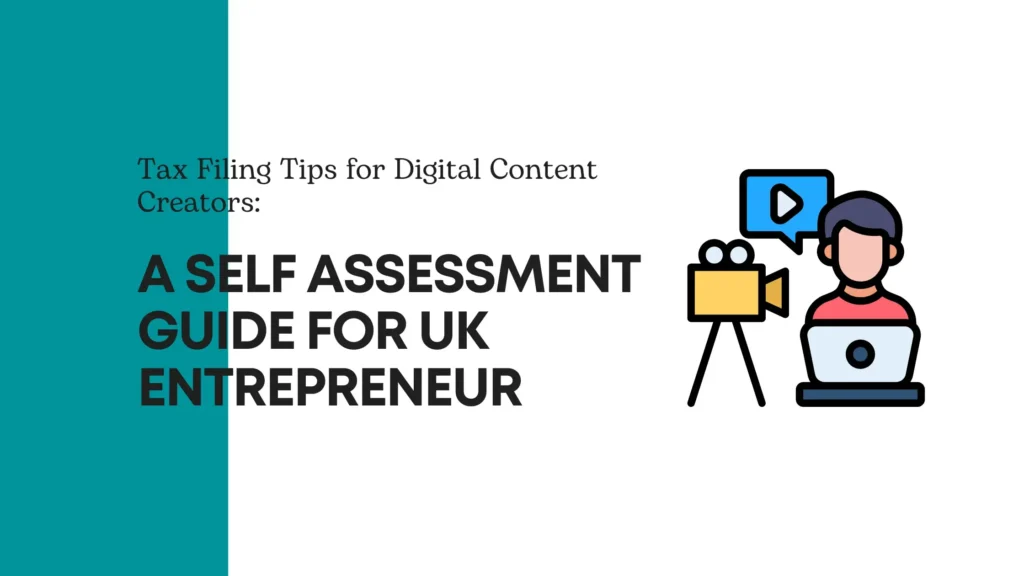Making money from YouTube, TikTok, Instagram, or freelance projects counts as self employment in the eyes of HMRC. Even if it’s only a side hustle, you’re responsible for keeping track of your earnings and paying the right taxes.
Filing taxes properly helps you avoid fines, stay organised, and understand how much you really earn after expenses. In the UK, this process is called Self Assessment, where you report your income and costs to HMRC each year. The tax year runs from 6 April to 5 April, and the online filing deadline is 31 January. It’s simple: treat your content like a business and tax season won’t be stressful.
Understanding the Basics Need to File a Tax Return
If you’re earning money from your content whether it’s through brand deals, ad revenue, or selling digital products it’s important to know when you need to tell HMRC. The UK offers a £1,000 trading allowance, which means if your total gross income from content creation is under £1,000 in a tax year, you don’t need to register or file a tax return for that income. But once you earn more than £1,000, you must register as self employed and complete a Self Assessment tax return. You can do this easily through the HMRC website.
For most creators, taxable income includes:
- Brand deals and sponsorships
- Affiliate commissions
- Ad revenue from YouTube, TikTok, or blogs
- Digital product sales (courses, presets, ebooks, etc.)
- Merchandise sales
- Payments or gifts from collaborations
A common misconception is that gifted products or free PR items aren’t taxable. If a brand gives you something in return for a post, review, or mention, HMRC considers it payment in kind, meaning it has a taxable value.
Simply put if you’re getting paid or rewarded for your work in cash or gifts, it counts as income and needs to be declared.
Tax filing steps for Digital Creators
Once your income from content creation passes £1,000 a year, it’s time to register for Self Assessment. You can do this through the HMRC website make sure you do it before 5 October following the end of the tax year you started earning.
After registration, HMRC will give you a UTR number, which you’ll need for filing your taxes.You’ll need this number to set up your online account, file returns, and make payments. Keep your UTR safe, along with accurate records of all your income and expenses such as invoices, receipts, and payment statements from platforms or brands.
Your tax return must be filed online by 31 January each year, and any tax due must be paid by the same date. Missing this deadline can lead to automatic penalties, so it’s best to start early.
Soon, the UK will fully roll out Making Tax Digital (MTD). This system will require self-employed people including digital creators to record and submit quarterly updates using HMRC approved software. Digital creators with income over £50,000 in the 2025-26 tax year, or £30,000 in 2026-27 and beyond, must submit quarterly updates via MTD. So, not every digital creator needs to do this. MTD is being introduced gradually, getting used to digital bookkeeping now will make the transition easier for those who need to comply.
Don’t Delay Submit your Self Assessment Before The Deadline
Submit your tax return by 31 January to avoid late filing penalty. Swiftacc offers expert Self Assessment tax return services, starting at just £99.
Book an AppointmentWhatsApp UsDeductions, VAT & Record Keeping for UK Content Creators
List of everything you earn and spend. Tools like Xero, QuickBooks, or FreeAgent make it easy to track income, store receipts, and stay organised.
You can claim allowable expenses to lower your tax bill, such as:
- Equipment (camera, mic, laptop)
- Software and subscriptions
- Home office costs (a fair share of rent, utilities and internet)
- Travel and marketing expenses
If something is used for both personal and business purposes, only claim the business portion. You must register for VAT if your annual turnover goes over £90,000. For international work, VAT rules vary depending on where your clients are based. However, you may need to follow the tax rules in the customer’s country. If your client is an individual or non-business outside the UK, you may need to charge UK VAT, as the place of supply is where you are based.
Smart Tips for a Stress Free Tax Season
- Start by using a separate bank account for all your content income and expenses this makes it easier to track your money and prevents personal and business funds from mixing.
- It’s also smart to set aside 25–30% of your income for taxes as you earn it. This way, when payment deadlines come, you won’t be caught off guard. Always keep backups of invoices and receipts, as HMRC recommends retaining records for at least six years.
- Rather than waiting until the end of the year, make it a habit to review your finances monthly. Checking your income and expenses regularly helps you spot errors early and keeps your accounts organised.
- As your content business grows, especially if you work with international brands or have multiple income streams, taxes can get more complex. At that point, hiring a professional accountant who understands digital creators can save time, reduce stress and you stay compliant
Think of your content as more than just posts or videos, it’s a business. Staying organised with your finances isn’t just about avoiding fines; it gives you the freedom to grow, experiment, and focus on what you love. Plan to track your income and expenses, and tackle taxes step by step. When you get it right, tax season becomes just another part of your creative journey stress free and under control.

